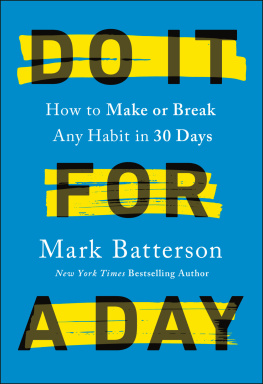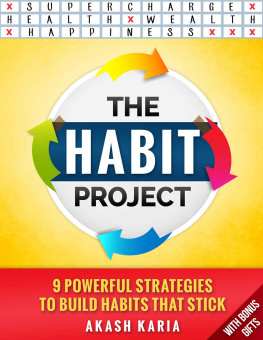"We are what we repeatedly do. Excellence, then, is not an act, but a habit."
~ Aristotle.
Thank you for purchasing The Habit Handbook .
Your life today is basically the sum of your habits.
How in or out of shape are you? A result of your habits.
How happy or unhappy are you? A result of your habits.
How wealthy or poor are you? A result of your habits.
What you repeatedly do (i.e. what you spend time thinking about and doing each day) ultimately forms the person you are, the things you believe, and the personality that you portray.
But what if you want to improve? What if you want to form new habits? How would you go about this?
Turns out, theres a helpful framework that can make it easier to stick to new habits so that you can improve your health, wealth, and life in general.
How can we have the best intentions to become better, and yet still see so little progress?
We all have goals. Overall, this is a good thing. Its nice to know what you want and having goals gives you a sense of direction and purpose. However, there is one way that your hopes and dreams actually sabotage you from becoming better: your desires can easily lure you into biting off more than you can chew.
Too often, we let our motivations and desires drive us into a frenzy as we try to solve our entire problem at once instead of starting a small, new routine.
Life goals are good to have because they provide direction, but they can also trick you into taking on more than you can handle. Daily habits tiny routines that are repeatable are what make big dreams a reality.
Chapter 1: How Habits Work
People are often impatient when it comes to the formation and reinforcement of habits. Everyone wants a quick fix that will readily incorporate their desired habits to their current routines, but it is not as easy as it sounds.
The simple truth is that habits take some time to stick. According to the Merriam-Webster Dictionary, the definition of habit is:
- a behavior pattern acquired by frequent repetition or physiologic exposure that shows itself in regularity or increased facility of performance; or
- an acquired mode of behavior that has become nearly or completely involuntary.
Take note of the key phrases: behavior pattern, frequent repetition, and acquired mode of behavior. These phrases imply that it takes time and effort to form a habit and to actually live by it.
Another tricky thing about the formation of habits is that it does not have a singular formula that will apply to every person in every situation. For example, the habit of regularly going to the gym will be different between a person who is physically active and a person who is mostly sedentary. At the same time, the habit of regularly going to the gym has a different formula from the habit of quitting smoking. In other words, if you are looking for a proven formula that will specifically work in your situation, you might be wasting your time.
However, do not lose hope just yet. There is a general framework that will help you calibrate the process to your own situation and variables. This general framework comes in two parts: 1) the 3 Rs, which we will discuss at length in .
Basically, the formation of a habit is determined by a neurological loop that is defined by the 3 Rs: Reminder, Routine, and Reward. This loop was identified by researchers from the Massachusetts Institute of Technology (MIT). According to their study, the 3 Rs of habit will help you understand how a cycle or routine becomes a habit. They can also help you identify the ways with which you can change a current habit or create a new one.
When you have familiarized yourself with the 3 Rs and are ready to break the cycle, you then proceed to the next step, which is to set a plan for yourself. What can you do differently? How do you implement changes? How can you make these changes stick? We will answer these questions later on.
For now, you have to understand one thingYOU ARE YOUR HABITS. You are defined by your routines. Your productivity, contentment and happiness are, in large part, affected by how you run your life.
And so, you are faced with a choice: Do you control your habits or do they control you? You have to understand that once a habit is formed, it turns into an almost involuntary action, if not at all. Therefore, once you have cemented a habit into your everyday routine, you have little to no control over it. It becomes a part of you and, at times, may actually take control of you.
The most obvious example of a bad habit is smoking. If you have enjoyed smoking since you were young, it will be hard for you to stop it now. Even though the effects of this habit to your health are detrimental, it has effectively taken hold of you. Breaking the cycle will need serious commitment and it is possible that you may fall back to the same routine once in a while.
The same goes with procrastination. Believe it or not, finishing tasks in the nick of time is almost always a habit that has formed over many years. If you feel like you are always in a rush to get things done, then procrastination is a bad habit that has effectively taken control of your life.
However, this control is not inherently bad. For example, if you have formed a habit of taking a morning stroll every day, it is actually good for you. It can be your form of exercise or it can be a way for you to relax your mind before you face the day ahead. Other good habits include cleaning your house every weekend, going to the gym regularly, and enjoying a warm bath to unwind after a hard weeks work.
It may be challenging to create good life-long habits that will have a positive effect on your physical, mental, emotional, and social health, but you should not give up. There are steps that you can follow to break your bad cycles, and we will discuss just how to do that in the next chapter.
Chapter 2: Habit Formation
The process of habit formation is not easy. There are different factors affecting our ability to form new habits (or to end current ones), and we will discuss each of these factors in this chapter, beginning with the 3 Rs.
The 3 Rs
At the core of every habit, there is a neurological loop that dictates our actions and affects our routines. We have already mentioned this loop in the previous chapter, and it is formed by the 3 Rs: Reminder, Routine and Reward.
Think about this loop for a moment:

A habit is cued by a reminder, which then affects your action or routine, which then gives you a sense of reward or fulfillment, and so on. In other words:
- Reminder: the trigger that cues your action or behavior
- Routine: the action or behavior itself
- Reward: the sense of fulfillment or benefit that you get from doing an action or by following a behavior
To break a bad habit or to start a new one, you have to familiarize yourself with these three components. You can only eradicate a habit if you understand why you keep doing it in the first place. At the same time, you can only create a new habit if you know what can trigger it and what you can get from it.









